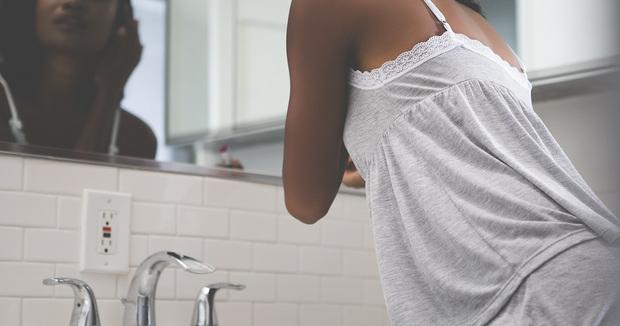Can Birth Control Make My Acne Better?

Whether you deal with acne all month or just around your period, birth control may be able to help.
From the pill to the patch, and the ring to the IUD, there are a few options to choose from to keep your birth control covered and your skin clear. Here’s what two medical professionals suggest. For more information, visit a provider at your nearest The Right Time health center.
Option 1: A combined hormonal method
If you have acne, any combined hormonal birth control method may be able to help you manage it. Combined hormonal methods, which contain progestin and estrogen hormones, include a bunch of different kinds of pills, the ring, and the patch. One advantage of the combined (a.k.a. combination) pill is that there are a few types to choose from, so you have flexibility to find a different formulation if you don’t like the first one you try. “There isn’t one [combined] hormonal method that has been shown to control acne better than any other,” says Dr. Colleen Krajewski of Magee Women’s Hospital-UPMC.
Q. How do I choose a combined hormonal method?
A. Use our method explorer to check out the additional benefits of combined pills, the patch, and the ring, and get in touch with a provider at a nearby The Right Time health center. They can make a recommendation for the best combined method to try based on your individual health history and lifestyle.
When it comes to choosing a combined pill, there are a lot of different options. Three brands—Estrostep, Ortho Tri-cyclen, and YAZ—might seem the most familiar because they are approved by the FDA for the treatment of acne. This means the makers of these three brands asked the FDA for approval to advertise treatment of acne—but research has shown that other combination pills are just as effective for treating acne. “It doesn’t matter which combination pill you choose,” says Krajewski. “Any type of combination pill will be just as effective for managing acne.”
Q. Is my hormonal birth control method making my acne worse?
A. “If you are on a formulation of a pill that is making your acne worse, your provider can help you find a new formulation,” says Krajewski.
Progestin-only methods have shown mixed results with acne. “The amount of progestin in the Mirena and the mini-pill is very minimal,” says Krajewski. “If you are acne-prone, they might not affect your skin. However, the amount of progestin in Depo-Provera is very high and could exacerbate acne. For other people, Depo-Provera could help.” Linda Dominguez, CNP, of Southwest Women’s Health, recommends avoiding Depo if you’re prone to acne unless it’s your only option. If you’re acne-prone and considering a progestin-only method, your provider can make a recommendation for the best method for your skin.
Option 2. A hormonal IUD, plus additional coverage
With a hormonal IUD, you can have all the effectiveness and ease that IUD users love paired with a combined pill or prescription acne medication. “While the combination pill is a tried and true method for improving acne, one out of ten women become pregnant using that method alone,” says Krajewski. “You can use the pill to manage acne and use the IUD as your birth control method, as well as to help with menstrual flow.” Using the hormonal IUD and a combined pill is a great way to back up your birth control, manage hormones, and treat acne.
Another option for pregnancy prevention and serious acne control is to pair that little T with a prescription acne medication. “If you are someone who doesn’t like how you feel on birth control pills, has a reason you can’t take birth control pills, or just wants a highly effective method, you can try the IUD and a prescription acne medication,” says Krajewski. “Because of the risk of birth defects, many acne medications are not prescribed to people using less effective [birth control] methods such as the pill, patch, or ring. However, it is possible to combine the hormonal IUD and a prescription acne medication. Treating acne with a prescription should be a collaborative effort between you, your provider, and a dermatologist.”
Q. What if I’m using birth control to manage acne, but it’s not working?
A. If you’ve just started using a new method to improve your acne, it might take a while for your body to adjust to the change. Try waiting a few weeks, or even a few months, to see if your acne improves. Check in with your provider periodically if your skin isn’t clearing up.
Q. Can I improve my acne without using hormonal birth control?
A. If you don’t want to use hormonal birth control, there are some great hormone-free birth control options you can try while you work with topical solutions for acne. “A simple skincare routine can go a long way,” says Dominguez. “Save Netflix for later and get a good night’s sleep. Eat healthy and drink lots of water. If you do have pimples or blackheads, don’t pick or squeeze, which can spread bacteria and lead to scarring.”
If you are planning on getting off a combined method and nervous about your acne getting worse, talk to a provider at your nearest The Right Time health center to prevent acne when you stop taking the pill.
Updated October 2019
Related Content


Article
What Does “Dual Protection” Birth Control Mean?It usually means using a condom along with another birth control method.

Article
January is Cervical Cancer Awareness Month: What to Know About HPV and ScreeningA positive HPV test can feel scary, but healthcare providers at your nearest The Right Time clinic can help.

Article
Own Your Well-Being in 2026 with These 3 Sexual Health ResolutionsFirst: prioritize preventative sexual and reproductive health care.



















